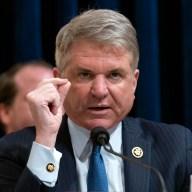 Kathryn Harrold and Albert Brooks in ‘Modern Romance’
Kathryn Harrold and Albert Brooks in ‘Modern Romance’
Valentine’s Day itself has come and gone, thankfully, but not every couple was able to celebrate their love on a Thursday. That means the festivities can conceivably last throughout the weekend. And that means the single and lonely – as well as less amorous duos – still have the chance of being traumatized by happy lovers staring into eachother’s eyes and engaging in gory PDAs.
To counteract the wrath of St. Valentine, here is a handful of anti-romantic films, in which coupling does not quite work out:
“The Awful Truth” (1937): The screwball comedies of the 1930s offered a respite from the more sincere traditional romantic comedies of the era. They still do. Manic in tone and pace, they also offered refreshingly skeptical, if not cynical, looks at romance. Leo McCarey (“Duck Soup,” “An Affair to Remember”) won a directing Oscar for this cockeyed comedy, in which a wealthy couple (Cary Grant and Irene Dunne) break up and struggle to not reunite. Spoiler: they get back together, but it’s not without a fight. Or several of them.
“We Won’t Grow Old Together” (1972): Best Title Ever. Maurice Pialat is France’s most sour filmmaker, which is saying something, and this is his most sour film, which is also saying something. Jumping through time, eliding no doubt even more unpleasant moments than we see, it details a couple (Marlène Jobert and Jean Yanne) who shouldn’t be together. She’s mousy; he’s a jerk (and likely based on Pialat himself, who was notoriously temperamental with his actors). Don’t worry: the title is accurate.
“Annie Hall” (1977): In its original form, Woody Allen’s Best Picture winner was a shapeless, epic (read: around 2 ½ hours long) exploration of the memories and absurdist observations of Woody stand-in Alvy Singer. In post-production, Woody and his editor realized the scenes with Alvy’s girlfriend (Diane Keaton) worked better than the rest of it. What started out as a free-form experimental narrative became a still quite experimental look at the rise and fall of a relationship – one of cinema’s saddest, most honest and, of course, funniest.
“Modern Romance” (1981): Though he’s sometimes misinterpreted as Woody Allen-lite, Albert Brooks offers the dark side of the more famous comic director: where Woody’s screen persona is ultimately lovable and righteously anxious, Brooks’ is selfish, needy, obsessive and, sometimes, sociopathic. It’s not a comforting sign that Stanley Kubrick was a huge fan of Brooks’ second directorial outing, in which his Hollywood editor breaks up with his beautiful if insecure girlfriend (Kathryn Harrold), regrets it, tries to win her back and then, once they’re reunited, instantly suspects her of infidelity. These are two people who shouldn’t be mating, although it’s debatable that Brooks’ monstrous need monster should be mating with anyone. (New Yorkers: this weekend Anthology Film Archives – under the program title “Valentine’s Day Massacre” – screens “Romance” with the aforementioned “We Won’t Grow Old Together.” As a friend pointed out, they’re basically the same movie, although one’s a little funnier.)
“The War of the Roses” (1988): Danny DeVito has a dark sense of humor, and it’s arguably never been put to better use than in his uncompromisingly pitch black look at a couple (Kathleen Turner and Michael Douglas) who fall in love, fall out of love and then sport fisticuffs and other blunt objects in a battle over their beloved manse. Even when you think they’re going to reunite, the film finds a way to swat that feeling away – at one point, literally.
“Eternal Sunshine of the Spotless Mind” (2004): Michel Gondry and Charlie Kaufman’s time-jumping break-up film – which liberally borrows the premise of Alain Resnais’ 1968 French film “Je t’aime, je t’aime” – finds Jim Carrey and Kate Winslet each erasing memories of their failed relationship. Of course, that means they may just fall back in love, then spectacularly out of it, again. In fact, Kaufman has said his original ending would have had them doing just that, over and over again, until their deaths.
“(500) Days of Summer” (2009): Emo boys have tried to co-opt this as a portrait of a nice guy (Joseph Gordon-Levitt) whose heart is ground into dirt by a cute mean girl (Zooey Deschanel). But even Gordon-Levitt has voiced opposition to this reading, pointing out that it’s really an unflattering portrayal of nice guys, who, the film argues, are self-absorbed, oblivious to others and contaminated by romantic delusion.
“The Future” (2011): No matter what you think of Miranda July’s performance art, her feature-length films (this and “Me and You and Everyone We Know”) are far more interesting than they perhaps should be. After a periodically intolerable first half, her second film turns into a perversely bleak look at a couple (July and Hamish Linklater) drifting apart. The devastating final shot, which seems to last forever, is as grounded in reality as the beginning was lost in irritating quirk.














